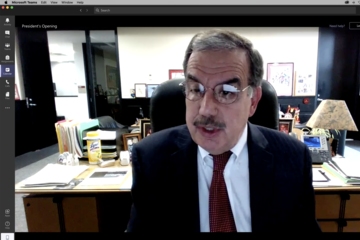
08/27/2020
SUNY Cortland President Erik J. Bitterbaum Thursday used his Fall 2020 Opening of School Meeting to discuss the three concurrent crises facing the university: the COVID-19 pandemic, the impact of New York state's budget shortfall and the consequences of racial injustices in America.
Delivered remotely to faculty and staff through Microsoft Teams, President Bitterbaum was hopeful as he noted how the university has always faced and overcome the challenges of the past. In reviewing the two primary history books about SUNY Cortland, President Bitterbaum said he found inspiration in how faculty, staff and students came together through events such as the fire that destroyed campus in 1919, student deployment to the military during World Wars I and II and the unrest that happened in Cortland following the killing of four students at Kent State University in 1970.
“I’ve come away with an overwhelming sense that our past and our present have been shaped by a highly talented and dedicated group of men and women, thinkers and dreamers who were truly doers,” he said. “I have confidence that when the third history of the university is written, it will chronicle our collective ability to manage the impact of the pandemic and emerge in the future as an even stronger institution.”
President Bitterbaum thanked all of the faculty and staff who have worked to both create a plan to safely reopen campus this fall despite the ongoing pandemic and revisit curricula to make distance learning possible and successful for students.
The COVID-19 pandemic has decreased tax revenue for New York state, meaning that decreased state funding is in the university’s future. President Bitterbaum said that the university’s strategy going forward will be to guard enrollment, ensure that students can graduate on time, find greater efficiencies and sharpen its focus on SUNY Cortland's core mission.
SUNY Cortland will continue to explore ways to increase revenue, including growing extended learning programs, strengthening international student admissions and offering more distance education.
“We will navigate these choppy waters successfully, but difficult decisions, both individually and collectively, are inevitable,” he said.
The university’s efforts on anti-racism were also highlighted by President Bitterbaum. He noted that the President’s Council on Inclusive Excellence has invited more than 40 faculty and staff to be members of an anti-racist taskforce and that students, faculty and staff had three productive online workshops over the summer through the Black Lives and Liberation Forum.
“The United States remains a complex and perplexing place, founded on words like ‘equality’ but consistently unable to ensure that all of its citizens are treated equally,” he said. “It highlights the need for Cortland to reflect on how we should respond as a community to the challenging and polarizing issues encompassing racial inequalities in America. This is a difficult time in our country and we need to be proactive and address these issues head-on, especially for the sake of our students.”
President Bitterbaum shared that he had recently received a phone call from an alumna asking if SUNY Cortland was supportive, nurturing and welcoming of people from all points of view, including those from lower-income community, first generation college students and those who identify as LGBTQ. Creating a caring environment for all remains SUNY Cortland’s mission, Bitterbaum said.
To underscore that commitment, the second half of the president's opening meeting was a presentation by Edward Fergus, an associate professor of urban education and policy at Temple University, on developing cross-cultural skills in the classroom.
“Building a diverse university community is not the work of a moment,” he said. “It will require sustained commitment, concerted effort and the attention of us all. We are working to diversify the voices here are Cortland. We recognize the strength we gain from different views and world experiences that come from a campus rich in the diversity of our people.”
Other campus highlights noted by President Bitterbaum:
- The university’s admissions rate remains strong.
- Renovations to Moffett Center and Casey and Smith Towers were completed this summer.
- A new, 138-space parking lot is now open along Lankler Drive near the Stadium Complex.
- SUNY Cortland was named No. 5 in the nation on the “Best Public College in Each State for Getting a Job in 2020” by Zippia.com, a career resource website.
- The Cortland Fund raised more than $1 million during the 2019-20 financial year, a single-year record.
- The Campaign for Cortland has raised more than $20 million of its $25 million goal.
- The Student Emergency Fund, which meets the needs of students facing unexpected hardship, has raised more than $334,000 to help students during the COVID-19 pandemic.
- The university has hired five new faculty members in the sciences through SUNY’s Promoting Recruiting Opportunity Diversity Inclusion and Growth (PRODiG) program, which aims to increase the representation of historically underrepresented faculty across the system.
President Bitterbaum concluded his remarks by asking faculty and staff to continue working hard in the face of challenges this semester to ensure bright years for the university in the future.
“There will be a day when the pandemic is over,” he said. “We will hug our students, our neighbors and our friends and we will return to our classrooms and coffee shops. Our borders will eventually reopen to freer movement. Our economy will recover from the forthcoming recession. We will rejoice.
“I have always remembered Robert Kennedy’s pronouncement: “Only those who dare to fail greatly can ever achieve greatly.”
“Thank you for what you have done and will do for Cortland and its students. I look forward to our future.”